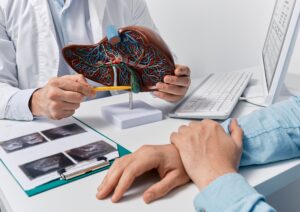When someone is struggling with opioid use disorder, and wants help, medication-assisted treatment for opioids can be an effective option. MAT, or medication-assisted treatment, is an evidence-based approach to treating opioid addiction. MAT combines medications with counseling and behavioral therapies to provide a “whole-patient” approach to treatment.
The main medications used in MAT are methadone, buprenorphine (Suboxone), and naltrexone (Vivitrol). Patients can access this type of during detox, as well as ongoing, to help them maintain their sobriety.
How Does MAT Help Opioids?
These medications act on the same brain receptors as opioids. However, they do not produce the same euphoria or high that opioids do. This helps reduce cravings for opioids and blocks their effects if someone relapses.
In addition, counseling and behavioral therapies help patients address underlying issues related to their addiction, such as stress, trauma, and depression, which can further support long-term recovery from opioid use disorder.
Overview of the Need for Detox for Opioids
It is hard to stop using opioids because they work on the same brain receptors as natural painkillers, meaning that when someone uses them regularly, their body develops a dependency. This can make it difficult for an individual to quit without medical intervention, as withdrawal symptoms can be intense.
If someone attempts to stop on their own, the withdrawal symptoms can become so severe that the only way to make them stop is to start using opioids again. As such, when someone is serious about quitting, medical detox is highly recommended.
Medical detox typically involves gradually tapering off opioid use, which can be done through a medically-supervised detox program. Detox may also involve medications to help manage withdrawal symptoms such as nausea, vomiting, insomnia, and agitation.
Medications Used in Medication-Assisted Treatment for Opioids
Some of the more common medications used in medication-assisted treatment for opioids include the following:
- Methadone: Methadone is a long-acting opioid agonist that works to reduce cravings and withdrawal symptoms associated with opioid addiction. It can also block the effects of other opioids if someone relapses.
- Buprenorphine (Suboxone): This medication is an opioid partial agonist medication. It binds to the opioid receptors in the brain and produces weaker effects than illicit, full agonists, like heroin, fentanyl, or meth. This makes it safer for use in treating opioid addiction, as buprenorphine can help reduce cravings without causing a high as stronger opioids would.
- Naltrexone (Vivitrol): Naltrexone is an opioid antagonist medication that blocks the effects of other opioids if someone does relapse, making it effective at preventing overdose deaths while on MAT treatment.
Are There Risks or Side Effects with MAT?
Yes, there are potential risks of side effects with MAT. Common side effects may include nausea, vomiting, constipation, drowsiness, dizziness, headache, or increased energy levels. Other more severe side effects, such as liver damage and seizures, can also occur. This is why medically-supervised detox is crucial to reduce the risks of potential side effects when using MAT.
What are the Benefits and Processes Of Medical Detox?
The benefits of medical detox are that it can help individuals safely and effectively manage withdrawal symptoms associated with opioid addiction. Detox is typically the first step in treating opioid addiction and should always occur under the supervision of qualified medical professionals who monitor physical health during treatment.
Medications may also be used to reduce cravings and ease withdrawal symptoms, making the process more manageable. During medical detox, patients receive 24/7 monitoring from healthcare providers to ensure safety throughout the process while being supported by mental health counselors to address underlying issues related to their addiction.
This comprehensive approach helps prepare individuals for further treatment, such as ongoing MAT or other forms of counseling that can support long-term recovery from opioid use disorder.
Who is Ideal for Medication-Assisted Treatment for Opioids?
A good candidate for medication-assisted treatment (MAT) for opioid addiction is someone who has completed a medically-supervised detox program and is committed to long-term recovery. MAT combines medications with counseling and behavioral therapies to provide a “whole-patient” approach to treatment.
So the person must be willing to engage in both aspects of the program. It is also crucial that the individual has access to medical care throughout their treatment. Furthermore, after discharge, regular follow-up appointments are necessary for monitoring progress and managing any side effects or complications associated with MAT.
Who Is Not Ideal for MAT?
Someone not committed to long-term recovery from opioid addiction would not be a good candidate for MAT. For MAT to be effective, the person must want help to overcome their addiction. However, if they are still in denial or do not want help, MAT may not be appropriate.
Additionally, if someone has an active substance abuse disorder or has recently used opioids, they may not be eligible for MAT immediately due to the risk of overdose. Instead, they would have to start the detox process first and then start MAT later once it was safe to do so.
Personalized, Safe Opioid Detox in Beautiful Pompano Beach, FL
The Retreat of Broward in beautiful Pompano Beach, Florida, is a DCF and Joint Commission-accredited medical detox center that offers personalized medical detox from opioids with MAT. Start your detox today by contacting us.






